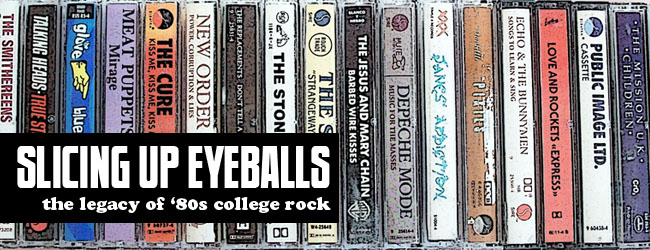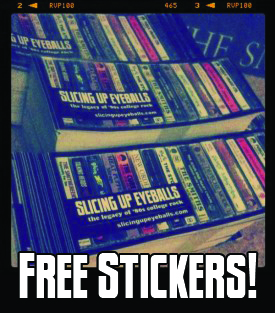
When it came time for Echo & The Bunnymen guitarist Will Sergeant to put together a new band “outside of the restrictive confines of Bunnymen-world” last year, he actually ended up tapping some Bunnymen for the job: namely former bassist Les Pattinson, who has been playing with The Wild Swans of late, and current drummer Nick Kilroe.
Yet the result — a three-piece instrumental group named Poltergeist — isn’t going to be mistaken for the Bunnymen anytime soon, and not just because it lacks the distinctive croon of Ian McCulloch. The band, as Sergeant points out in a new interview with Slicing Up Eyeballs, mines Krautrock and prog rock influences (“To my mind, Krautrock is just German for prog rock,” Sergeant quips).
Poltergeist’s debut album, the eight-track Your Mind Is a Box (Let Us Fill It With Wonder), is due out next week on CD and double vinyl on Sergeant’s own 92 Happy Customers label.
The band was slated to play four U.K. shows this week, but Pattinson fell ill and was hospitalized over the weekend. Tonight’s show in Bristol has been postponed, while concerts in York, Manchester and Glasgow may need to be, too, according to the group’s management (see full dates below).
Last week, Sergeant — who also has begun work on a new Bunnymen album with McCulloch — graciously agreed to answer a few questions from Slicing Up Eyeballs via e-mail:
SLICING UP EYEBALLS: ‘Your Mind is a Box (Let Us Fill It With Wonder)’ is the second instrumental album you’ve released over the past year, although they’re quite different. Is there something liberating or freeing that you’re finding while writing songs that don’t have to be structured for verses and choruses?
WILL SERGEANT: The whole process of both albums has been liberating. It has kept me sane(ish). Working on a project that has freedom woven in its heart is very important for me. I like to let things appear and then I take the path they present and just enjoy the journey. There is structure to the songs, verse and chorus, etc., with hook lines and blasts of melody. But we do not tie the music down with a formula dictated by a lyrical content. I believe this is what the main difference is between Poltergeist and my solo work and most of the more mainstream stuff I have been involved with. We do not have the pressure of trying to get to the top of some ridiculous list or chart, we don’t want to compromise what we do to get on a radio play list.
We have financed the albums via Pledge Music. I like the Pledge way of working it enables us to do what we want. Both the recent projects are on my own label, 92 Happy Customers, so we don’t have to answer to someone in control of the purse strings, giving us grief about the length of the songs or some other trivial crap. I even managed to keep the dreaded barcode (we will all have one soon) off the cover of the album.
EYEBALLS: After recording ‘Things Inside,’ what prompted you to form an actual band for your next extracurricular project? Or where you just looking for an excuse to play with Les again?
SERGEANT: I had it in my mind to have a band outside of the restrictive confines of Bunnymen-world, I have had it in my mind to call it Poltergeist for many years. It has a nice feel of Teutonic darkness, and it fits in perfectly well with the influences of Krautrock, which I openly admit to.
Everything is influenced by something. The Bunnymen were influenced by punk, The Velvet Underground, Bowie, Roxy Music and psychedelia, etc., etc. And all of that lot were influenced by blues, folk or LSD.
My daughter reminded me the other day that over the years when we would play “Guitar Hero” on the PlayStation (I am really crap at it) I always called my band Poltergeist.
I did not need an excuse to play with the mighty Les Pattinson. Les has always been my friend through thick and thin. I have known him since we were 11 years old. It was obvious when it was pointed out to me by Peasy of our management, that Les should be involved. You sometimes really can’t see the wood for the trees. He had played some acoustic bass parts on ‘Things Inside’ for me and it was a very easy process, he knows instinctively what to do. He had also been dipping his toes back into band work with our friend and ally Paul Simpson’s band The Wild Swans (we all went to the same school). So I approached him with the idea, he was a little reticent at first. I think leaving the Bunnymen had left a stale taste in his mouth. but he is enjoying everything about being in a band again now.
EYEBALLS: Speaking of Les, what did he bring to this project?
SERGEANT: I had quite a few ideas on my hard drive which I had built up over time, but not much of it was in a finished state. Me and Les listened to what I had amassed, the ones that fitted the concept of Poltergeist were winkled out into a Poltergeist folder. Then with him in the loop we were able to get them into shape. Les comes at things from a different angle than me and that sets me off at a tangent to his ideas. This is what I wanted, to be able to bounce off another person and find new interesting pathways to oblivion.
EYEBALLS: And how was it for you writing and playing with him in a non-Bunnymen context?
SERGEANT: It has been a lot of fun, really. Les is very fresh with his ideas, he has had a good break and he is not as full-on a music nut-job like me. He is a practical bloke who can fix things, he can analyze the music and sees what needs to be ‘fixed’ His playing and choice of notes are really interesting. Along with Nick we all have a common interest in sending the listener’s mind to other worlds without having to spell it out with lyrics. Nick is an incredibly inventive drummer if he is given the freedom to take it to new areas. We like the idea that people have a film playing in their heads and that our music becomes the soundtrack. We would love to be involved in making a soundtrack for a film.
EYEBALLS: You’ve described Poltergeist as being somewhere between Krautrock and prog rock. Do you find there’s a common ground, a meeting place between those genres that perhaps gets overlooked?
SERGEANT: To my mind, Krautrock is just German for prog rock. Kraut is seen as the cooler cousin to progressive rock, but both genres have their fair share of dross mixed in with the gems. They just have different accents in a musical language. Both were influenced by the war (World War II), or a reaction against it anyway. The war was still very fresh back then. Most of the bands would have had a father fighting in the armies of both sides. This would have coloured their way of thinking and dealing with the past. My dad was in the war and as a kid I felt that WW2 was still very close. People would often mention things that happened during the war. The German and the British hippies wanted to put that behind them and move on with a fresh head. Plus Vietnam was an ongoing open sore at the time, so the hippies of Europe and America had war very much at the forefront of their minds. Today, we are still involved with several wars, but I don’t see it reflected in music of today much.
The Germans came at it with a more hypnotic rhythm-based kind of sound. Neu, Can, Harmonia, La Düsseldorf, Cluster, Tangerine Dream, Kraftwerk are all masters of this. I remember back to my school days in the early 70s, the few kids with the Roger Dean Yes logo drawn (including me) onto their school bags would also be the ones who would seek out more interesting bands like Guru Guru, Amon Düül or Can. It was a completely different world back then. Things actually could still be underground and difficult to find. Now it’s all available for you to have. Because it’s so easy to find anything, I think this is one of the reasons why the vinyl revival is in full swing. Collectors want to feel like they own something tangible, rare or difficult to find. It’s like they have a sacred relic from the religion of rock. There is a radical Luddite feel about it. It’s like saying, ‘Stick your technology and your 21st century up your arse.’ I myself am not opposed to technology, but it is easy to become entranced by it and sanitize sounds in the digital realm then lose the warmth. A balance needs to exist to keep the human input. If in doubt, stick it through a fuzz box.
EYEBALLS: With a song like “Psychic Warfare,” which is more than three times as a long as a traditional pop song, is there a special challenge to constructing a more complicated song like that — or is it really just born out of jamming with Les and Nick and seeing where that takes you?
SERGEANT: The song is not that complicated, it just seems that way because you don’t have lyrics as signposts to lead you from one part to the next. We have tried to keep the listener engaged and have new things to get into as the songs progress’s. There is a fine line between trance or boredom. Having said that, there is a lot to be said for the comfortable aspects of repetition in music. I like repetition and I like randomness. I think we have the balance just about right. Structure and chaos is what the world and all of us are made of, and Poltergeist is a reflection of this.
EYEBALLS: On a lot of these songs, so many of which have really great grooves and deep basslines, they sound like they must be a lot of fun to play live. What has the live experience been like with Poltergeist, and do you find, given the nature of the songs, that you’re able to take them to new and interesting places on stage?
SERGEANT: In my head I only ever wanted it to be a three-piece, a power trio, three sides of a mystic triangle. From the very beginning I wanted this to be a live band. We even recorded the songs with one eye on how we would be able to do it in a live format. And never let the complexity of the instrumentation get out of hand. We have only done two shows up to now, one in London and one in Liverpool, but we have some more coming up in June and beyond. We do have some of the live set, background sounds and atmospheres on tape, so we can’t meander too much from the path. But some of the passages are so long that we can experiment within the structure and still be able to get back home before the next big change in the music. We are starting to get people noticing that it’s not just a sub-Bunnymen offshoot, but has its own dark and intense identity and power. We are getting offered more gigs as the word spreads and the feeling is that the Poltergeist ball is starting to pick up momentum.
EYEBALLS: I understand you and Ian are working on a new Bunnymen record this summer. Does the experience of making something like ‘Your Mind is a Box’ carry on to your next project — in this case, the Bunnymen — or is it a compartmentalized outlet to get something out of your system so that you can return fresh to writing songs with Ian?
SERGEANT: I think compartmentalized is more what I am thinking at the moment. The two projects can live quite happily together.
Poltergeist tour dates:
June 17: The Louisiana, Bristol, UK
June 20: Fibbers, York, UK
June 21: Sound Control, Manchester, UK
June 22: King Tuts, Glasgow, UK
PREVIOUSLY ON SLICING UP EYEBALLS:
- Echo & The Bunnymen to begin recording new Youth-produced album in coming weeks
- Stream: Poltergeist, ‘Cathedral’ — off debut album from Echo & The Bunnymen spinoff
- Echo & The Bunnymen spinoff Poltergeist announces debut album ‘Your Mind is a Box’
- Echo & The Bunnymen’s Will Sergeant, Les Pattinson form new band Poltergeist
- Echo & The Bunnymen’s Will Sergeant brings ‘My Own Worst Enemy’ art show to L.A.
- Echo & The Bunnymen’s Will Sergeant records ‘Things Inside’ instrumental album












Thanks for posting! While I love the Bunnymen, they’ve missed Les’ groove for a while now, no offense to the current bassist.
I’ve enjoyed what I’ve heard from Poltergeist so far too. Nice to have Les and Will back together.
At this point, Les>Ian.
The Bunnymen are my favourite band of all time. That said, the last few lps have been quite lame and a bit boring.
Reverting to and developing on the “Heaven Up Here” sound (which is what Poltergeist’s “Cathedral” reminds me of) would do it for me!
Was really disappointed with this album. It all sounds same-y, same grooves, same old riffs. It just sounds old. Sadly, the Bunnymen should just stick to the greatest hits at this point.
Hi i also did an interview with Will about Poltergeist.
http://figure8magazine.co.uk/default/fill-it-with-wonder-will-sergeant-of-poltergeist-interviewed/